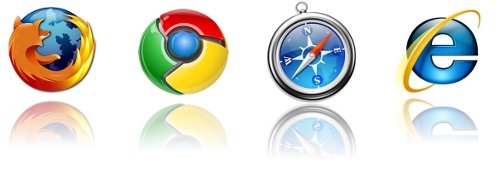
Two browsers opened one after another, both running the same web application. One browser was IE9 beta, and it sped breezily along as it ran the speed read test at Microsoft’s IE Testdrive site.
The other browser was Firefox’s 4 Beta 6, and in comparison it crawled.
The whole point of this experiment was to showcase to the assembled crowd of journalists and bloggers — of which I was one such attendee — that Microsoft’s IE9 beta was superior. Microsoft wanted to tout its new IE9 beta — unveiled globally on 15th September last week — at a sit-down session with the media early this week.
Both IE and Firefox beta browsers offloaded web rendering to the GPU on the graphics card, but Microsoft’s message was clear: we’re the better product here. We’re streamlined, we’re fast, and we’re easy to use.
Microsoft also showed off cool things like tab tearing, which is the ability to move tabs from one browser pane to another. They also showed off some really slick Windows 7 integration with IE9. For example, you can pin a Facebook webpage to the taskbar, and this will pop-up a notification when an update appears on your Facebook wall. In essence, the concept is a little like turning a webpage into a pseudo desktop application.
But slick scripted presentations aside, what really matters is this: what do users and developers think of the IE9?
To find out, I went around to do a straw poll of some colleagues and friends of mine.
IE9 from a developer’s perspective
Now, these friends of mine are no ordinary users. The big advantage of working in a tech company, especially a web-based one, is that I’m surrounded by folks who eat, live and breathe browsers.
These friends of mine try out every browser beta they get their grubby hands on, can explain in detail what works, why it works and why a browser is good or bad. In short, they are expert power users, both from the user point of view, and also from the developer point of view.
And the rough sense I get from my friends is that IE9 beta, from what little they’ve seen so far, is a step in the right direction.
My colleague, javascript expert and hardcore geek Kenny Shen went as far to remark: “[IE9] It’s the first IE that I like”. Chief amongst his complaints were the inconsistencies that developers had to endure when coding for prior versions of IE, which didn’t follow strict HTML web standards. For example, the lack of transparency support for PNG images in IE7 was one pain point that infuriated him.
With Microsoft playing by the rules in IE9, supporting HTML 5 and CSS 3, Kenny felt that this is “progress in the right direction”. As an ardent supporter and frequent participant in the open source community, Kenny also gave points to Microsoft for trying to reach out to developers.
For example, he recounted a time at GeekCamp 2009 when a Microsoft evangelist offered the local JQuery community (an open source Javascript library) the use of their Microsoft auditorium for future code jams. In the past, the battle lines between open source and Microsoft would be drawn so tight that this would never have occurred. In the end, the group moved to hackerspace, a local code jive cafe, but the point of Kenny’s story is that at least Microsoft tried.
IE, Firefox or chrome?
Still, it remains to be seen if IE9 will change the impression geeks have of IE. In a company of 14 individuals, of the 13 folks that I polled, no one in my company, from the interns to the coders to sales used IE as their default browser. Mike, my CTO, said: “I use IE only when I do compatibility testing.”
Perhaps the start-up that I work for is very much a geek company and not representative of the larger population, but I would argue that we’re an important demographic: It’s us geeks who evangelize to our friends what technologies to use.
About 60 per cent of us use Google’s Chrome, with the rest on Firefox. Many of my colleagues were Firefox supporters, but eventually moved to Chrome for a variety of reasons: stripped-down interface, larger browsing screen. I know my own story mirrored this.

Lastly, let me end this story with an email interview I did with Ian, a friend from local 3D company G Element. Ian heads up the front-end web development for 3D, so like Kenny, is intimately familiar with the innards of browsers.
Ian’s very specific about what he likes and doesn’t, which is great. The following comments are his own, and do not reflect the views of his company.
What do you use for browsing, and what browsers do you do work on?
-
As an end user, I use Firefox for browsing, Opera for mail (I use it to browse links sent through email) and a little bit of Chrome. Chrome’s mainly to have a separate session, e.g. when I want to logon to a different Google account while staying logged on to my main account. I don’t use IE at all.
For developer usage, I have almost every version of Fx installed from 2.0 up (something you can’t do cleanly with IE), Chrome, Opera, and IE6 (ouch). While there are 3rd-party solutions (e.g. MultiIE) to getting multiple versions of IE installed on one Windows instance, since we do browser plugin development, these 3rd-party solutions don’t behave close enough to a native installation for us so we have different IE versions on different machines.
What do you think of IE9 beta as a end user and as a developer?
-
As an end user, I’m far too used to my customized Firefox by now. Nevertheless, let me give my first impressions:
- It’s a shame IE9 is not available for XP, but hey, they’ve got to sell operating systems.
- Tab tearing is neat! Our plugin survives tearing off, which is pretty impressive. Granted, this isn’t a common operation, but it’s still nice to have.
- I’m not a fan of the address bar and tabs bar being on the same line. Makes the address bar too short to read. Somewhat related, since the tab bar is limited to one row, this makes tab titles unreadable once you have 10 or so. FaviconizeTab ftw.
- The clean look is nice initially, but similar to Chrome, this means a lot of the functionality gets tucked away and takes more clicks to access. e.g. Reopening the last browser session – you need to show the Command bar to access that.
- On that topic, session management is still very basic. Nothing compared to Tab Mix Plus.
- I’ve read about the performance enhancements, but in my short usage it didn’t feel like a huge difference.
- IE Developer Tools are nice, but still lag behind Firebug. Haven’t used IE9’s enough to tell whether there’s much improvement over IE8’s.
- The promised standards support could be a good step in the right direction, but I haven’t tested it enough to know if it is.
- Even more IE modes to deal with. Ouch.
As a developer:
Which browser do you prefer to use and why?
-
Firefox. I love the fact that it is highly and easily customizable. Browsing is such a rich and complex activity that browsers should fit themselves to users, not the other way around.
As a side note, even my wife who isn’t too fond of technology prefers to use my customized Firefox over IE. 🙂
What are the strengths of IE?
-
IE’s main strength is that it is pre-installed on every Windows installation, and that users are familiar with its interface. The fact that there are still legacy sites which work on IE only make it impossible to totally do away with.
Hardware accelerated rendering could be a plus, but I think on current websites it’s a far smaller issue than having good basic browsing functionality.





I want all the browser developers (Opera, Google, Apple, etc…) to team up with Mozilla to make the best and fastest Firefox yet, and wipe the floor with IE.
@John
Well, this is the stance Microsoft wants to portray — that they’re the best for GPU-assisted web rendering. For now.
For me, browsers are judged on more than simply one function. 🙂
And as you said, both Firefox and Chromium are also doing great research in this area. We should see even better browsers come up in the future.
“Both IE and Firefox beta browsers offloaded web rendering to the GPU on the graphics card, but Microsoft’s message was clear: we’re the better product here. We’re streamlined, we’re fast, and we’re easy to use.”
Maybe you shouldn’t have left it at that? It implies that IE9 “is” the better product, done and dusted. In fact Firefox 4 as of Beta 6 doesn’t have hardware acceleration fully implemented yet, and Chrome is showing signs of very good performance improvement in quick time.